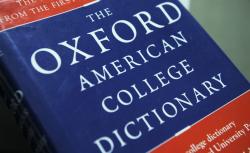Yesterday Oxford Dictionaries announced their USA Word of the Year, and we have both good and bad news. The good news is that the USAWotY is not YOLO. That’s “you only live once,” the latest teenage shorthand for “I did something really reckless and dumb but I don’t regret it.” Along with superstorm, super PAC, Higgs boson and Eurogeddon, YOLO will mercifully go down in history as an Oxford 2012 also-ran, despite the fact that Zac Efron has it tattooed on his hand.
The bad news is that Oxford has instead selected GIF as its USAWotY—and even if GIF were actually a W, as opposed to another acronym, we would find the choice hard to forgive. For starters, 2012 has so far afforded the OUP word czars a trove of politically resonant possibilities: malarkey, job creator, self-deportation, Romnesia, Obamacare. And the media machine has used the past 12 months to immortalize such phrases as double down, 47 percent, and fiscal cliff. But the real problem, as Jen Doll at the Atlantic points out, is that GIF is a relic of the last century, coined in 1987—even if its supposed migration from the noun to the verb column (a process known to language buffs as zero-formation) happened more recently. OUP Lexicographer Katherine Martin explains:
The GIF, a compressed file format for images that can be used to create simple, looping animations, turned 25 this year, but like so many other relics of the 80s, it has never been trendier. GIF celebrated a lexical milestone in 2012, gaining traction as a verb, not just a noun. The GIF has evolved from a medium for pop-cultural memes into a tool with serious applications including research and journalism, and its lexical identity is transforming to keep pace.
She makes the selection sound defensible, but have you ever heard GIF used as a verb? Here at Brow Beat HQ we talk about GIFs more than most, I suspect. And yet this particular usage has never crossed my path.
Oxford Dictionaries’ grand rival in the word-coronation business, the American Dialect Society, does a much better job with their WotYs, if you ask me. (Full disclosure: Some prominent members of that Society have contributed to Slate.) They wait—prudently, respectably—until December to anoint a lexical nugget. Their deciders (decider was an ADS runner-up in 2006) are linguists donating their time to a nonprofit, while the OUP words are selected by a joint team of linguists and publicists. Last year, the ADS brilliantly picked occupy for the 2011 honors, while Oxford went with an off-key head scratcher, squeezed middle, that nonplussed word-nerds in the states and prompted my colleague David Haglund to deplore the organization’s provincial judgment. (Haglund suggested occupy as a superior choice.) The pattern holds for 2010, too: That year, the ADS spotlighted app because the Smartphone doodads were becoming a kind of perceptual filter. The refrain “There’s an app for that” applied to everything, to the point where a social activity without an app seemed as strange as a person without a shadow. But Oxford reached for low-hanging fruit with refudiate, a Palin coinage no richer in irony or import than any of the other misstatements we hear from politicians on an almost daily basis.
As app proves, it’s not that the ADS is deaf to trendy computer jargon. In fact, their 2009 word of the year was tweet, and they recently crowned google the word of the decade. But these interwebby terms have proved durable. And at least we know how to pronounce them.
